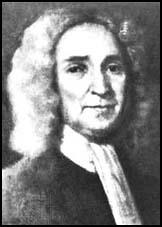John Cotton

John Cotton was born in Derby, England in 1595. After being educated at Trinity College, Cambridge, he became vicar of St. Botolph's Church in Boston, Lincolnshire in 1612. Over the next 21 years Cotton became increasingly critical of the Anglican Church and began to express Puritan views.
In 1630 Cotton gave a sermon to John Winthrop, Thomas Dudley, William Pynchon, Simon Bradstreet, Anne Bradstreet and others about to sail from Southampton to North America. In his sermon Cotton emphasized the parallel between the Puritans and the God's chosen people, claiming it was God's will that they should inhabit all the world. This sermon was later published as The Divine Right to Occupy the Land.
When legal action was taken against Cotton in 1632 he decided to emigrate to North America. He settled in the Massachusetts Colony and he became the pastor of the First Church of Boston.
Cotton, a much loved figure in New England, wrote several pamphlets including, Democracy as Detrimental to Church and State (1636), The Way of the Churches of Christ in New England (1645), Spiritual Milk for Babes (1646) and The Way of Congregational Churches Cleared (1648). John Cotton died in Boston, Massachusetts, on 23rd December, 1652.
Primary Sources
(1) John Cotton, sermon preached at Southampton when John Winthrop and his party departed to America in 1630.
Now, God makes room for a people three ways:
First when He casts out the enemies of a people before them by lawful war with the inhabitants, which God calls them unto, as in Ps. 44:2: "Thou didst drive out the heathen before them." But this course of warring against others and driving them out without provocation depends upon special commission from God, or else it is not imitable.
Second, when He gives a foreign people favor in the eyes of any native people to come and sit down with them, either by way of purchase, as Abraham did obtain the field of Machpelah; or else when they give it in courtesy, as Pharaoh did the land of Goshen unto the sons of Jacob.
Third, when He makes a country, though not altogether void of inhabitants, yet void in the place where they reside. Where there is a vacant place, there is liberty for the sons of Adam or Noah to come and inhabit, though they neither buy it nor ask their leaves. So that it is free from that common grant for any to take possession of vacant countries. Indeed, no nation is to drive out another without special commission from Heaven, such as the Israelites had, and will not recompense the wrongs done in a peaceable way. And then they may right themselves by lawful war and subdue the country unto themselves.
(2) John Cotton disagreed that all colonists should have equal rights. He explained his views in his pamphlet, Democracy as Detrimental to Church and State (1636)
Demand: That the Commonwealth should consist of two distinct ranks of men, whereof the one should be for them and their heirs, gentlemen of the country; the other for their heirs and freeholders.
Answer: Two distinct ranks we willingly acknowledge, from the light of nature and Scripture; the one of them called princes, or nobles, or elders (among whom gentlemen have their place); the other, the people. Hereditary dignity or honours we willingly allow to the former, unless, by the scandalous and base conversation of any of them, they become degenerate. Hereditary liberty, or estate of freedom, we willingly allow to the other, unless they also, by some unworthy and slavish carriage, do disfranchise themselves.
